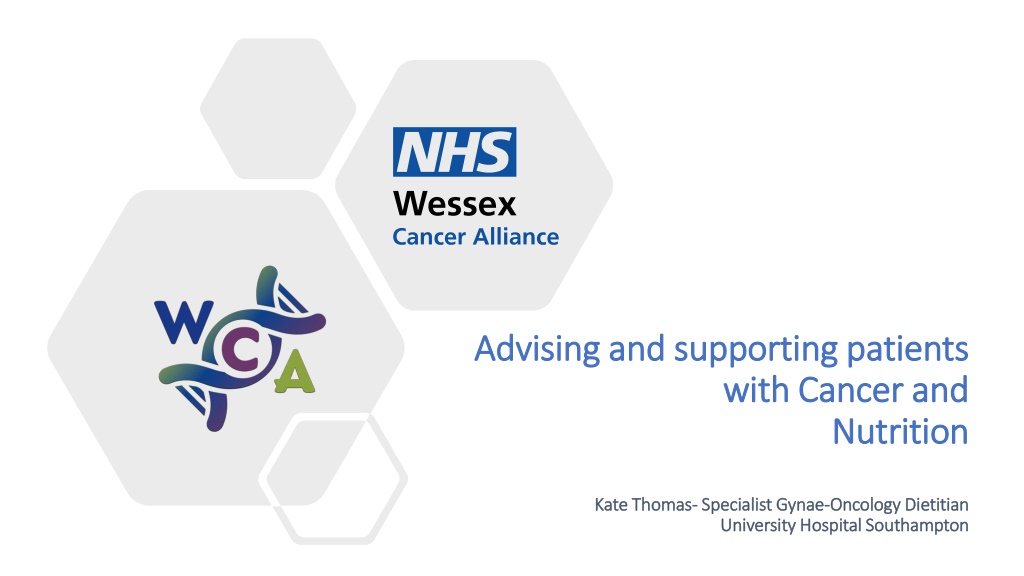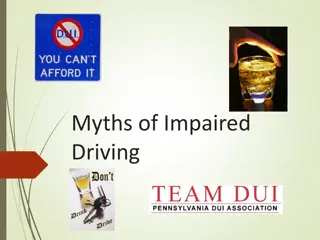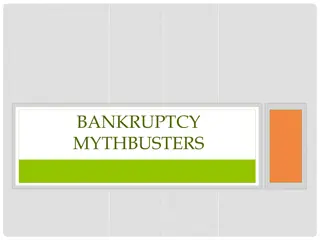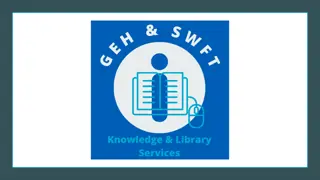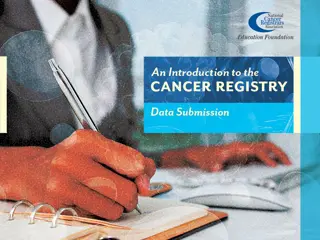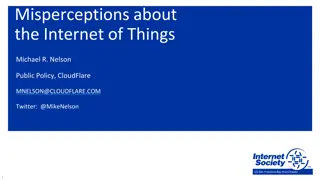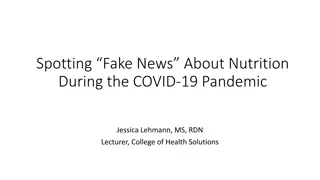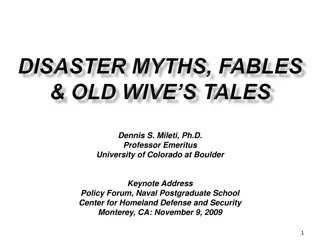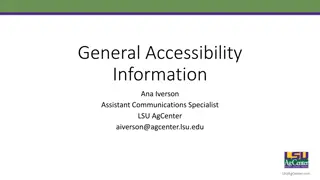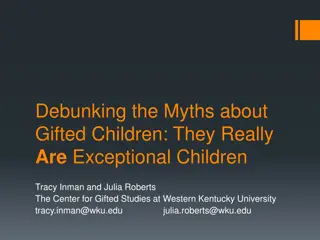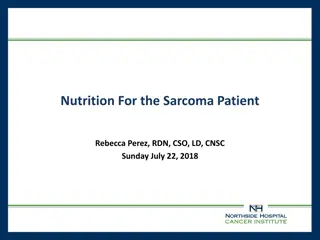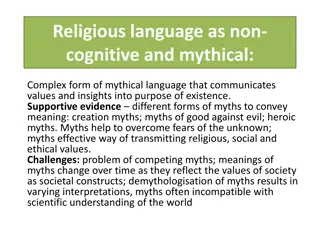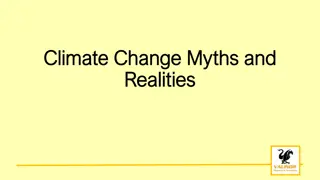Debunking Common Myths About Cancer and Nutrition
The journey of cancer diagnosis brings forth various challenges, including misconceptions about nutrition. Debunking myths like soy stimulating cancer cells, sugar feeding cancer, and acidic diets curing cancer is crucial for informed decision-making. Evidence shows that soy can be a part of a healthy diet, cutting sugar doesn't starve cancer cells, and an alkaline diet doesn't cure cancer. Understanding the facts helps in navigating a balanced approach to nutrition during cancer treatment and beyond.
Uploaded on Sep 21, 2024 | 1 Views
Download Presentation

Please find below an Image/Link to download the presentation.
The content on the website is provided AS IS for your information and personal use only. It may not be sold, licensed, or shared on other websites without obtaining consent from the author. Download presentation by click this link. If you encounter any issues during the download, it is possible that the publisher has removed the file from their server.
E N D
Presentation Transcript
Advising and supporting patients Advising and supporting patients with Cancer and with Cancer and Nutrition Nutrition Kate Thomas Kate Thomas- -Specialist Gynae Specialist Gynae- -Oncology Dietitian University Hospital Southampton University Hospital Southampton Oncology Dietitian
The news of a cancer diagnosis is an extremely difficult time for both patients and their families. It can bring about many psychological, emotional, spiritual and physical challenges for those being treated for and living with and beyond their cancer. It is understandable therefore that many will try to help fight cancer or alleviate treatment side effects through changing their diet. Some diets may result in interactions with cancer treatments, nutritional deficiencies, weight loss and muscle loss. Misconceptions from the media- myth busting
Myth: Isoflavones, found in soy products have a similar chemical structure to the hormone oestrogen. Oestrogen can stimulate some cancers, therefore it was thought foods containing isoflavones might have the same effect. Myth busting- soya Facts: Current evidence suggests that a diet containing naturally occurring Isoflavones is safe. Soya foods can be used as part of a healthy balanced diet as a non-meat source of protein and provide fibre. In fact, there is growing evidence that eating traditional soy foods such as tofu, tempeh, edamame, miso, and soymilk may lower the risk of breast cancer, especially among Asian women.
Myth: Sugar feeds cancer cells. Facts: Cutting out sugar in diet does not restrict glucose (sugar) to cancer cells. Sugars are found in a number of healthy foods including complex carbohydrates, fruits and vegetables. These are high in fibre, vitamins and minerals and have been linked with a lower risk of cancer. It is recommended to reduce excessive sugar in the diet, particularly in the form of free sugars or simple sugars (for example those found in sugary drinks) as these are linked with being overweight. Myth busting- sugar
Myth: An acidic environment promotes ill health whereas an alkaline environment is beneficial and promotes good health. It is claimed that the food you eat can affect the body s pH and that as our blood is naturally alkaline (~pH 7.4) eating acid foods upsets the balance. Facts: No consensus on grouping foods as acid or alkaline with many misclassified. Blood pH (7.4) is tightly regulated by the kidneys and respiratory system. Any excess acid is excreted in the urine. Blood pH is not altered by dietary intake. The alkaline diet suggests that eating an alkaline diet can create a hostile alkaline environment and therefore kill cancer. However neither cancer cells nor healthy cells can survive in an alkaline environment. There is no scientific literature establishing the benefit of an alkaline diet for curing cancer. The only situation in which blood pH is altered is during metabolic acidosis, when an individual is critically ill. Myth busting- alkaline diet
Myth: Hormones used in the production of milk promote hormone related cancerous tumour growth. Myth busting- Facts: There is no link between dairy containing diets and risk of cancer or promoting cancer growth as a result of hormones. There is evidence suggesting a protective role of dairy in the development of breast cancer through increased intake of calcium, vitamin D, butyrate, conjugated linoleic acid and lactoferrin. Evidence to suggest that dairy consumption can reduce the risk of bowel cancer. dairy
Myth: The ketogenic diet decreases tumour size and spread. Facts: The ketogenic diet is a low-carbohydrate diet. There are variations, with specific proportions of macronutrients depending on the type of ketogenic diet followed. The existing research is on animals and in brain tumours. Human data is based on single cases and demonstrated weight loss, which may be a concern. A high protein intake may counteract the ketogenic diet by providing glucogenic amino acids for production of glucose when the level of protein consumed exceeds the normal non starvation protein turnover. A ketogenic diet can cause symptoms of constipation, diarrhoea and fatigue. Adherence may be low due to palatability, and prolonged dietary restrictions. Myth busting- ketogenic diet
Myth: Turmeric can kill cancer cells and promote more from growing Facts: The active ingredient in turmeric is a substance called curcumin. Research has shown lower rates of certain cancers in countries where people eat more curcumin. This is at curcumin levels of about 100mg to 200mg a day over long periods of time. A few laboratory studies on cancer cells have shown that curcumin has anti cancer effects. It seems to be able to kill cancer cells and prevent more from growing. It has the best effects on breast cancer, bowel cancer, stomach cancer and skin cancer cells. We need more clinical trials in humans before we know how well it works as a treatment for cancer. Potential issues Safety Side effects- stomach pain Poor absorption Myth busting- turmeric
Myth: Complementary alternative medicines can increase survival and reduce recurrence, optimise treatment, alleviate side effects and boost immune system. Supplements Facts: Some vitamins and minerals could interfere with how well cancer drugs work. High dose antioxidants (coenzyme Q10, selenium, vitamins A, C, E) may help prevent cell damage but may stop chemotherapy from working as efficiently. Check with your oncology team before taking any supplements
Used to treat and prevent disease related malnutrition. Different types to accommodate varying nutritional needs, taste preferences and dietary requirements Oral Oral nutritional nutritional supplements supplements
References References Challenging cancer diets myths | British Dietetic Association (BDA) Turmeric | Complementary and alternative therapy | Cancer Research UK
